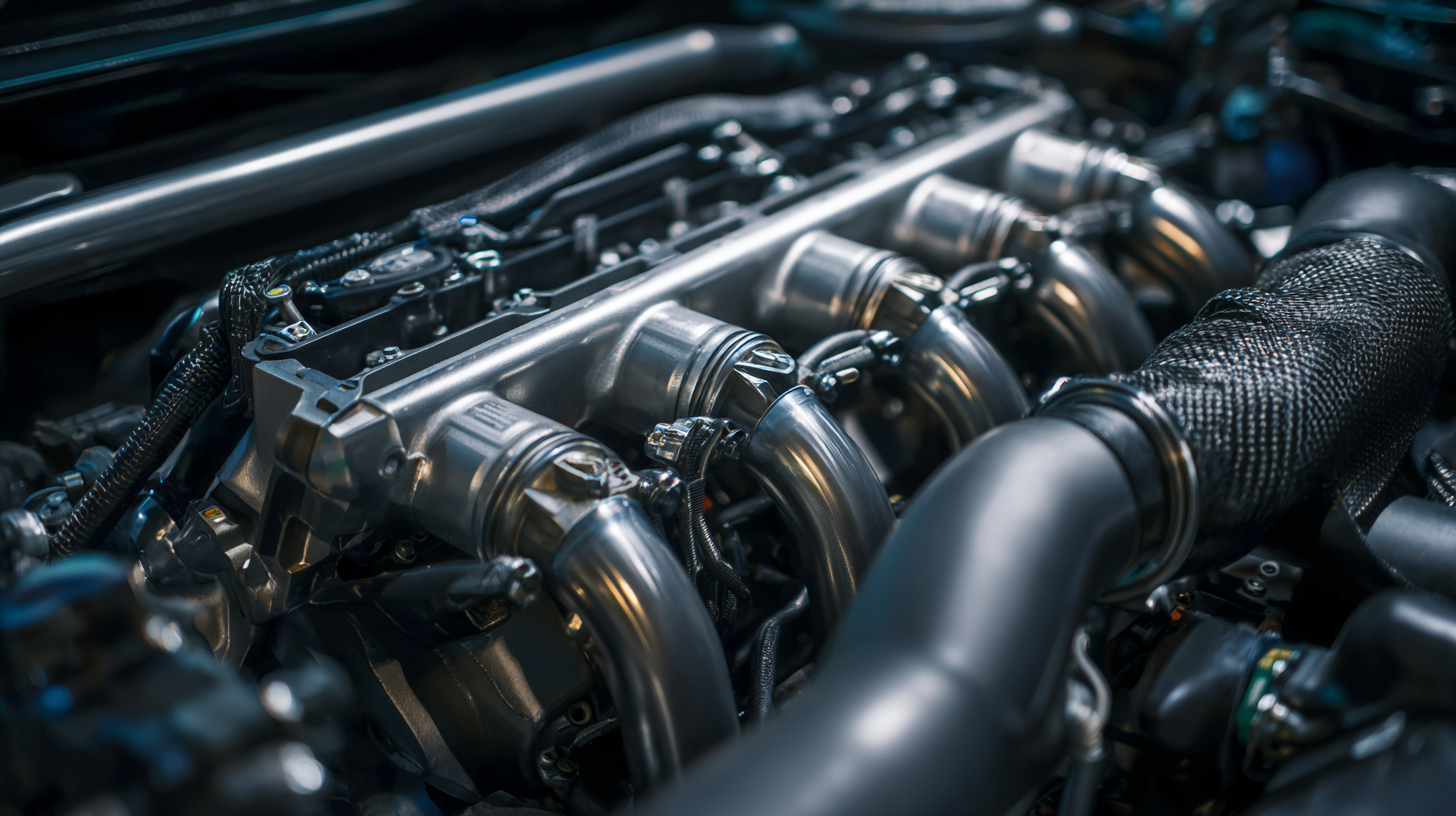7 Essential Tips for Choosing the Right Valve Exhaust System
Choosing the right Valve Exhaust System is crucial for optimizing engine performance and efficiency, yet many vehicle enthusiasts and professionals underestimate its importance. According to a report by Grand View Research, the global automotive exhaust system market is expected to reach USD 92.58 billion by 2025, highlighting a growing awareness of how exhaust components impact vehicle functionality.
A well-designed Valve Exhaust System can enhance exhaust flow, improve fuel economy, and contribute to lower emissions—a critical factor in meeting increasingly stringent environmental regulations. With advanced technologies and numerous options available, selecting the right system can be daunting.
This guide outlines seven essential tips to help you navigate the myriad of choices, ensuring you select a Valve Exhaust System that maximizes your vehicle’s performance while adhering to industry standards.

Factors to Consider When Selecting an Exhaust Valve System
When selecting an exhaust valve system, a few critical factors play a significant role in ensuring optimal performance and efficiency. First, consider the material of the valve. High-performance vehicles often require valves made from durable materials such as stainless steel or titanium, which can withstand higher temperatures and resist corrosion. The choice of material directly impacts the longevity of the exhaust system, as well as its ability to enhance engine power.
Another important aspect to evaluate is the design of the exhaust system. Look for features such as flow characteristics and sound management. A well-designed system not only promotes better exhaust flow, which can enhance engine performance, but also minimizes noise levels to comply with regulations and maintain a pleasant driving experience. Additionally, compatibility with your vehicle makes and models is essential. Ensure that the selected exhaust valve system is designed to fit seamlessly with your engine setup to avoid installation issues and maximize efficiency.
7 Essential Tips for Choosing the Right Valve Exhaust System - Factors to Consider When Selecting an Exhaust Valve System
| Factor |
Description |
Importance |
| Material |
Choose corrosion-resistant materials for durability. |
High |
| Compatibility |
Ensure the system is compatible with your engine type. |
High |
| Flow Rate |
Check the flow rate to optimize performance. |
Medium |
| Size |
Select the correct size for your vehicle specifications. |
High |
| Noise Level |
Consider the noise output compliant with regulations. |
Medium |
| Installation |
Evaluate ease of installation and maintenance. |
Medium |
| Warranty |
Check the warranty for reliability and support. |
Medium |
Understanding Different Types of Valve Exhaust Systems
When it comes to selecting the right valve exhaust system, understanding the various types available on the market is crucial. Valve exhaust systems can primarily be categorized into two main types: pneumatic and electronic. According to a recent report from the Global Valve Exhaust System Market Analysis, the demand for pneumatic systems has been steadily increasing due to their simplicity and effectiveness in low-pressure applications. By 2024, the pneumatic valve exhaust market is projected to grow at a CAGR of 6.5%, reaching a value of $1.2 billion.
On the other hand, electronic valve exhaust systems offer advanced control and precision, making them ideal for high-performance vehicles and industries requiring stringent emissions standards. A survey conducted by the Automotive Innovation Council shows that 70% of high-performance vehicle manufacturers are opting for electronic systems to enhance engine efficiency and reduce noise. This shift is indicative of a broader trend towards automation and improvements in exhaust management technology. Therefore, understanding the unique benefits and capabilities of each system is essential for making an informed choice that aligns with your specific requirements.

Key Performance Indicators for Evaluating Exhaust Systems
When evaluating exhaust systems, understanding
key performance indicators (KPIs) is crucial for ensuring
optimal engine performance. One of the primary KPIs is flow rate, which measures how efficiently exhaust
gases exit the system. A higher flow rate typically correlates with improved horsepower and throttle
response. Additionally, examining back pressure is essential, as excessive
back pressure can hinder engine performance and lead to reduced fuel efficiency. An ideal exhaust system
strikes a balance, maintaining enough back pressure to support low-end torque while allowing for free
flow at higher RPMs.
Another critical KPI is sound level and quality,
which can influence both performance and driver experience. The design of the exhaust system significantly
impacts the sound produced; a well-tuned exhaust will enhance the vehicle's character without being overly
noisy. Furthermore, considering material durability is
important for longevity and performance. High-quality materials can withstand extreme conditions and reduce
the frequency of replacements. By focusing on these KPIs—flow rate,
back pressure, sound quality, and material durability—enthusiasts
can make informed decisions when selecting the right valve exhaust system for their vehicles.
Common Mistakes to Avoid in Choosing Exhaust Systems
When selecting an exhaust system, many enthusiasts overlook critical factors that can lead to suboptimal performance and unnecessary expenses. One common mistake is focusing solely on the aesthetics or sound of the system rather than its functional benefits. While a flashy design or a throaty roar might be appealing, it's essential to consider how the exhaust system will impact overall engine performance, fuel efficiency, and emissions. Choosing a system that doesn't match the vehicle's specifications can result in diminished power and potential legal issues with noise regulations.

Another mistake is failing to research the different materials and construction methods available. Many buyers opt for cheaper options, unaware that inferior materials can lead to corrosion and a shorter lifespan. Stainless steel, for example, may come at a premium but offers durability and longevity that will save money in the long run. Additionally, neglecting to consult professionals or reliable reviews can lead to purchasing a system that doesn't align with your specific driving needs or style, ultimately affecting the vehicle's performance and value.
Importance of Material Selection for Durability and Performance
When selecting the right valve exhaust system, the importance of material selection for durability and performance cannot be overstated. According to a recent industry report by Research and Markets, approximately 45% of exhaust system failures are attributed to poor material choices. This highlights how critical it is to select materials that can withstand the harsh conditions within the exhaust environment, such as extreme temperatures and corrosive gases.
Common materials like stainless steel and aluminum are often favored for their ability to resist oxidation and thermal fatigue. Stainless steel, particularly types 304 and 316, is known for its excellent corrosion resistance and longevity, often outlasting lower-quality alternatives by as much as 50%. A study from the Society of Automotive Engineers indicates that the use of high-quality materials can improve overall system performance by enhancing exhaust flow and reducing back pressure. This, in turn, can lead to a more efficient engine operation, resulting in better fuel economy and lower emissions. Thus, making informed material choices is essential for maximizing the lifespan and efficiency of valve exhaust systems.
7 Essential Tips for Choosing the Right Valve Exhaust System
 +86 17870576410
+86 17870576410

Home
Company Profile
Products
News
Blog
Contact Us
 Contact Number
Contact Number







